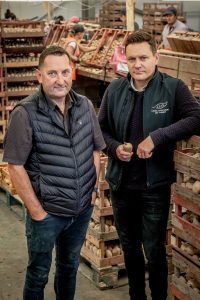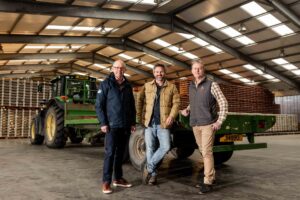
Alasdair Crosby spoke to Mike Renouard (business unit director) and Nigel Holliday (commercial director) of the Jersey Royal Company
This is an expanded version of the interview, under the same title, that appears in the Winter issue of RURAL magazine
The Jersey Royal Company is now over 20 years old and is the largest farm in the Island. It grows, packs and supplies the Jersey Royal new potato to UK retailers, mostly to the supermarket chains from which most of the British population buys its daily food and household supplies.
It farms around 8,300 vergées annually across 1,500 fields, and employing around 250 staff. It produces and packs approximately 14,000 tonnes of potatoes per year.
In 2014 it became part of Produce Investments PLC, the Berwickshire-based, and AIM (Alternative Investment Market) listed company, owners of the Greenvale AP company, based in Peterborough.
There are seven sister companies within the group, mainly concentrating on the integrated farming of potatoes and daffodils. In Jersey, the Jersey Fine Tea Company is a small member of the group, with a tea plantations on the slopes above Bouley Bay, near Gouray church and Hamptonne.
To obtain an overall picture of ‘the state of the potato’ as 2022 slowly winds on towards the following year’s season, two key players in the company commented on the season.

Mike Renouard’s title is ‘business unit director’. He has worked for the Jersey Royal Company (JRC) for over 25 years and has been promoted to head the Business Unit’ previously he was the company’s technical director. He is also a keen supporter of environmental projects.
Nigel Holliday joined the company when he first moved to the Island in 2009, was employed initially as the packaging manager and then became involved on the commercial side.
His background, perhaps unusually for his present job, was in aerospace, where he managed part of his company’s commercial bid team. Historically, the majority of potatoes went off Island in bulk. In 2009 they began to be pre-packed in the Island, which is where he came in. As commercial director of JRC, he oversees the company’s packaging, procurement and manages sales and marketing in respect of some of JRC’s key commercial accounts.
Between them, they told a story that is fairly dark – as it is for so much of agriculture.
The season
The 2022 growing season has been very tough. The weather has not been kind, although it wasn’t a bad planting season in the first few months – just a bit on the wet side, and reasonably mild. After early April, there was no more rain. July saw the hottest day ever in Jersey’s history. There was no rain all the way through to August, apart from one short spell, which was too light and brief to have any effect.
Mike said: ‘We were in drought conditions during our main growing and harvesting season, so unless we could irrigate, we got stunted growth and poor skin finish on the tubers. Harvesting in particular was a very dusty affair: there was dust on the potatoes and dry soils were hard on the machinery which increased maintenance costs. We had a low yield. It hasn’t been a great season.

‘It has also affected the seed for next year. We have had to concentrate on irrigating our seed crop – after all, that is our future.’
Marketing the crop
‘The market was very subdued across all sectors,’ according to Nigel. ‘Whether it was vegetables or fruit, fresh or frozen – they all saw a decline in sales. Also, for all the reasons that are constantly mentioned, we had extraordinary amounts of inflation, which we had to try to pass on to our supermarket customers. Shoppers were buying less, and were more price sensitive, both factors affected sales. It’s been a bit of a challenge.
‘That being said, the Jersey Royal is still one of the biggest brands in fresh produce. It is still a really strong name.
‘Our exports subsidise the cost to Island retailers of southbound containers. Without our volume the containers would on most occasions be going back empty. So even if we are not supplying much food for the Island, we are subsidising food coming in.’
The challenges
Numerous.
To detail the main problems:
- The cost of fuel. Increasing by over 85% in the past 12 months and continuing to fluctuate
- The cost of fertiliser: four times what it was two years ago
- Labour can be a challenge. The Jersey Royal Company now have to go further afield to find labour, which makes the situation more challenging. Five years ago most of the work force came from Portugal or Poland. Now they come from Romania, Bulgaria, Kazakhstan, Russia, Philippines, Brazil, Kenya…

- The minimum wage. ‘That really affects us,’ Mike said. ‘The reason for minimum wage is to help with the costs of living – and the main cost of living in Jersey is the cost of rental accommodation. Agricultural staff are not exposed to that as subsidised accommodation is supplied by their employers, which assists their living costs. We only charge for their accommodation the maximum offset that the minimum wage allows us, and that hasn’t been keeping up with the cost of living. The minimum wage has increased 31% since January 2020 or 46% since January 2018.
- The workers do not get medical coverage for the first six months of their employment. By the time they become eligible, the working season is almost over. If they return the next year, they have to start at the beginning again, with no medical coverage. Granted, that will be one problem less next year, as when returning workers who have been in the Island for six months in the preceding year will now automatically be covered.
- There is a big challenge from both early potato crops in the UK, and imports providing more competition for Jersey Royals. Nigel said: ‘Our seasonal window is under pressure at both ends of the season. That has affected our penetration of the market and the market has widened. We just have to continue focusing on quality and the Jersey Royal brand.
- And still there is no support from Government, although there is a lot of support from the public.
Local food from former potato land?
It has often been said that the amount of land currently under potatoes for an export cash crop should instead be used for producing local crops for local people.
Mike said: ‘Probably we will see that next year. We work very closely with dairy farmers and with Jersey Hemp. So there will be a decrease of land under potatoes. ‘But diverse crops for local people? That is my own background and enthusiasm in an ideal world. I used to work at Amalgrow.
‘But that concept is only viable if people are prepared to pay for those local crops. You can’t grow crops at a loss. People will need to pay a lot more money for their vegetable if they want local production.
‘The reason why Charlie Gallichan packed up, was that there was no money in growing vegetable for the local market. That is the same reason why we are not doing so. Especially as there is less tourism and fewer hospitality outlets than there used to be. ‘ The scales of economy to produce small quantities of various crops for 100,000 people just don’t stack up and it is much cheaper to import these crops from the UK.
The Covid factor
Every Island business had some form of support through the Covid pandemic – except agriculture, the sole exception.
Staff problems increased; there were problems in keeping staff isolated when working in the fields. There was extra time and expense in transporting workers to the field – making sure that the seating arrangements in the minibuses were Covid-compliant, for example. Although each group was isolated in their own ‘bubble’ during the working day, that didn’t stop some passers-by from taking photos and reporting them to the police for breaking Covid regulations.
Sales dropped off; customers both locally and in the UK had to queue to enter shops.
Industry representations to government for emergency funding had no effect.
On the positive side of farming…
- Earlier this year, JRC was officially launched as the Island’s first LEAF Demonstration Farm. See our article on page [???] titled ‘Demonstrating Sustainability’.
- The state of the soil continues to improve, as farming rotation period lengthen and eelworm and other problems and infestations are kept in check or eradicated. No anti-eelworm chemicals are now put on to the land.
- Regenerative farming is practised; cover crops are planted to improve the soil after the potato harvest.
- Their ‘best practice’ increases their yield without the necessity of using more land .
On the positive side of marketing the crop…
- A joint marketing campaign in 2022 with celebrity chef Jamie Oliver, who was promoting Jersey Royals. He ran a cookery class in the Jamie Oliver kitchen and a national campaign for people to buy tickets to his school he made videos featuring the Jersey Royal, which he shared on social media.
- For next year, Nigel said: ‘The focus of our campaign in 2023 is “Simply seasonal…. we know people are struggling to get by. Jersey Royals are quick and easy to cook and can turn a variety of everyday meals into a special treat, ideal for a time of austerity and inflation.”
- ‘The marketing thrust is mainly on social media and short form videos. Our traditional customers – those who used to come to the Island for their honeymoon or on holidays – are getting older. So social media is the way of promoting our product to the younger generation.
It is often said that the idea of ‘meat and two veg’ meals has become old-fashioned and outdated and potatoes have lost out to rice and pasta. Potatoes were seen to be ‘a bad thing’ for the Atkins Diet. But Jersey Royals are no less convenient to cook than pasta. Pre-packed Jersey Royals need no scrubbing or peeling; just pop them into water, let the pan boil and wait for 15-20 minutes. What could be easier?
- The younger generation, ‘Generation Z’, are into a more natural way of living and a more natural way of food. They are experimenting, they are learning to cook as opposed to relying on ready-meals.’
Nigel said: ‘90% of Generation Z prefer video advertising to static advertising. They spend 23% of their income on food & drink. They are experimenting, they are learning to cook as opposed to relying on Ready-meals.’
The perennial question: ‘Jersey Royals used to taste much better than they do now’. Did they agree?
In a word – No. That’s only nostalgia. The biggest variation on flavour profile is weather and growing conditions, but harvested at the right time, and grown in kind conditions Jersey Royals taste as good as they ever have.

In summary, Mike said: ‘The situation is very challenging and government needs to play a much bigger role than it has been doing. There is no level playing field with agriculture in other countries that are financially supported by their governments to a much greater extent.
‘If Jersey’s Government doesn’t support agriculture, there won’t be an agricultural industry in time and that will greatly affect the rural landscape that many take for granted.’





